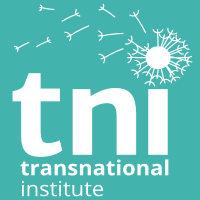Location
The Transnational Institute (TNI) is an international research and advocacy institute committed to building a just, democratic and sustainable world. For more than 40 years, TNI has served as a unique nexus between social movements, engaged scholars and policy makers.
The Transnational Institute (TNI) is an international research and advocacy institute committed to building a just, democratic and sustainable world.
Founded in 1974 as a network of ‘activist scholars’, TNI continues to be a unique nexus between social movements, engaged scholars and policy makers.
TNI has gained an international reputation for carrying out well researched and radical critiques and anticipating and producing informed work on key issues long before they become mainstream concerns, for example, our work on food and hunger, third world debt, transnational corporations, trade, and carbon trading.
As a non-sectarian institute, TNI has also consistently advocated alternatives that are both just and pragmatic, for example developing alternative approaches to international drugs policy and providing support for the practical detailed work of public water services reform.
TNI's Projects
TNI works on a wide range of interlinking issues. The constant interaction between fellows and projects gives TNI a unique, broad and informed perspective and enables a cross-disciplinary approach to complex global problems.
TNI's work currently includes:
- Leadership as a respected global voice on drugs policy, promoting a pragmatic approach to tackling illegal drugs based on harm reduction principles.
- Supporting a dynamic international network involved in building participatory, public sector water as the best way to achieve the goal of water for all
- Confronting the dogma of trade liberalisation, which like financial liberalisation has led to increased inequality, and helping to construct regional alternatives, such as the Bolivarian Alternative for the Americas, based on regional cooperation and solidarity
- Analysing and exposing the democratic dangers posed by the concentration of corporate power and proposing new legal frameworks of accountability for transnational corporations.
- Engaging with democratic innovations and experiments undertaken by social movements, progressive political parties and governments worldwide helping to empower communities to gain control over their lives and environment
- Drawing together and analysing the links between the different elements of the systemic crisis —financial, environmental and social.
Members:
Resources
Displaying 51 - 53 of 53Towards a Broader View of the Politics of Global Land Grab: Rethinking Land Issues, Reframing Resistance
Includes competing views of land-grabbing, Code of Conduct: consolidation of land-grab agenda, the many faces and directions of land use and land property relations change today, the ‘land sovereignty’ alternative.
From rural livelihoods to agricultural growth: The land policies of the UK Department of International Development
Examines the policies and practices on land of the UK’s Department for International Development (DFID). While DFID’s approach to land reform in the 1980s reflected the dictates of modernisation, formal registration and market-led distribution of land of the IFIs, this was followed 1997-2002 by a period where changes were made to move in the direction of a rights-based approach.
Strengthening Land Governance
General
The recent transition to market economy and creation of land market has led to increased land speculation. In the face of weak legal frameworks and institutions for their protection, the land access of women and men farmers, especially those (mostly ethnic minorities) living in upland shifting cultivation areas, is at risk. Land governance will be a central issue in any political dialogue with ethnic leaders. The rapidly evolving political environment presents both opportunities and risks for equitable land governance.



